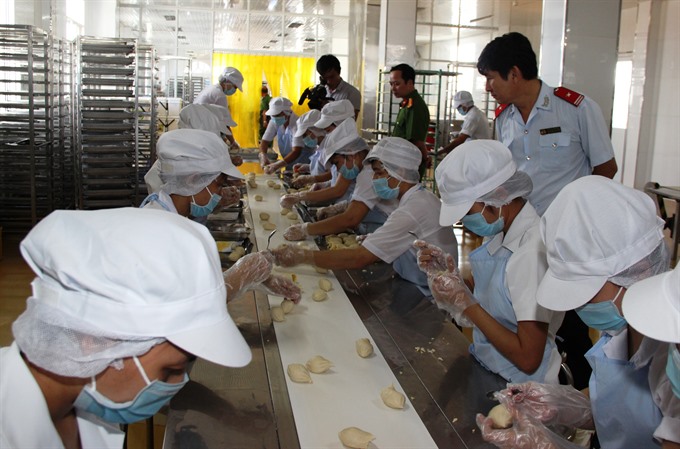 Society
Society

Producers and businesses are only allowed to use food additives permitted by the Ministry of Health to ensure products have no negative impacts on users’ health.
 |
| An MoH inspection team checks food safety and hygiene at Phúc An Food Company in the Mekong Delta province of Tây Ninh. — VNA/VNS Photo Lê Đức Hoảnh |
HÀ NỘI — Producers and businesses are only allowed to use food additives permitted by the Ministry of Health to ensure products have no negative impacts on users’ health.
The rule is stipulated by a freshly-released Government Decree which details regulations on the implementation of some articles of the Food Safety Law.
The use of allowed additives must meet food safety and hygiene regulations, meaning that they cannot exceed the permitted level, have clear origins and meet other related technical and management requirements.
The decree also regulates the granting of certificates on food safety and hygiene, state inspections of imported and exported products, food labelling and food advertising.
According to experts, food with excessive amounts of additives can be especially toxic to children, whose growing bodies are sensitive to chemicals.
For example, if children eat food that contains lead it will build up in their system and potentially cause bone cancer. Food that contains borax affects the nervous system and can negatively impact brain development.
Negative impacts associated with exposure to toxic food additives can include acute food-poisoning and cancer, according to experts.
Recently, there have been concerns about the risks of allergic reactions and asthma from certain additives.
The Ministry of Health has set up six inspection teams to check food safety and hygiene in 12 provinces and cities - Huế, Đà Nẵng, Hà Nội, Quảng Ninh and Sơn La, as well as Hòa Bình, HCM City, Bình Dương and Cà Mau, in addition to Kiên Giang, Lạng Sơn and Cao Bằng.
The inspections will focus on food being prepared for Tết. The inspection will last until April 2.
Nguyễn Thanh Phong, director of the Việt Nam Food Administration, said the inspectors would pay great attention to food origin, additives and preservation substances. Food samples would be tested and the results announced widely.
Last year, inter-disciplinary inspectors visited more than 625,000 places nationwide, finding violations at nearly 124,000, according to the National Steering Committee on Food Safety.
Of the violators, more than 35,700 had to pay fines exceeding a total of VNĐ61 billion (US$2.7 million).
The numbers of those poisoned by food in 2017 declined, but the number of fatality doubled that of 2016. The country recorded 139 cases of food poisoning last year with 3,869 people affected, down 27 cases.
A total of 24 people died from food poisoning in 2017. — VNS




